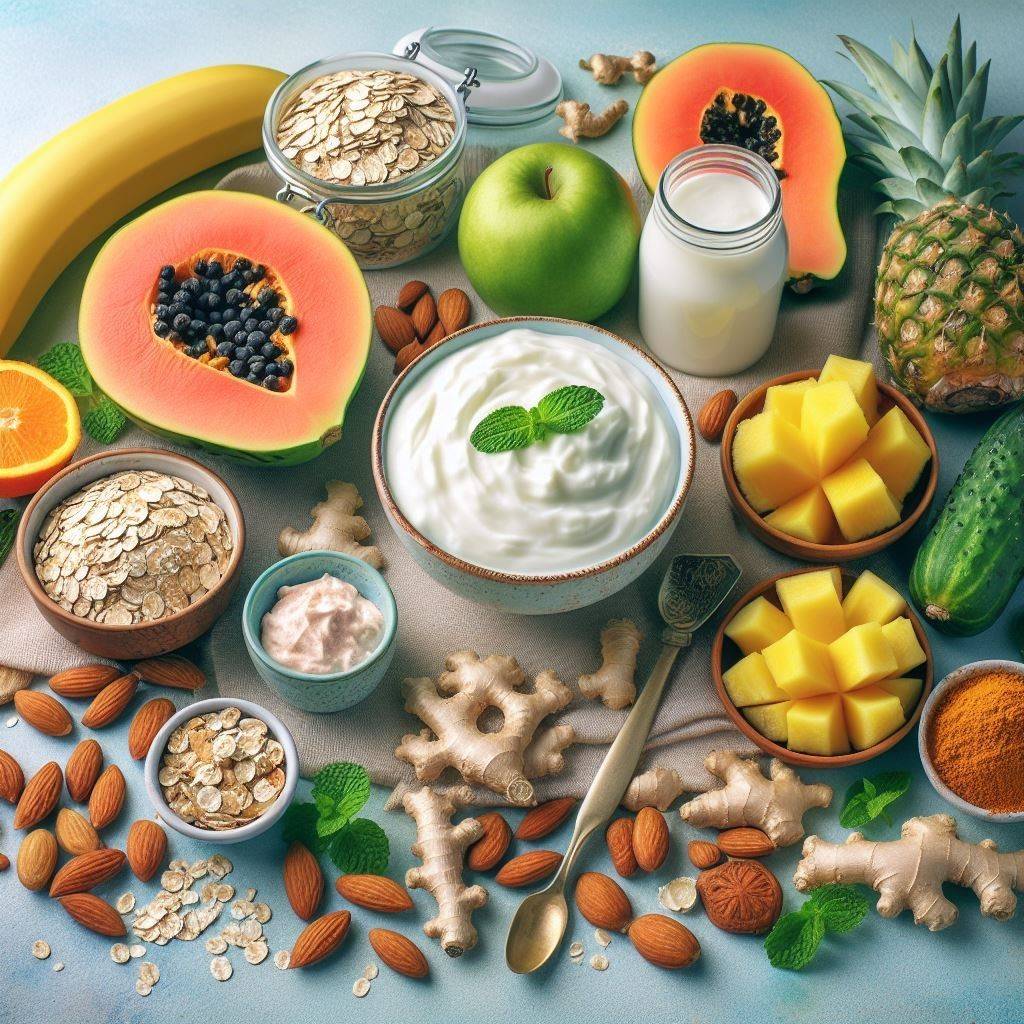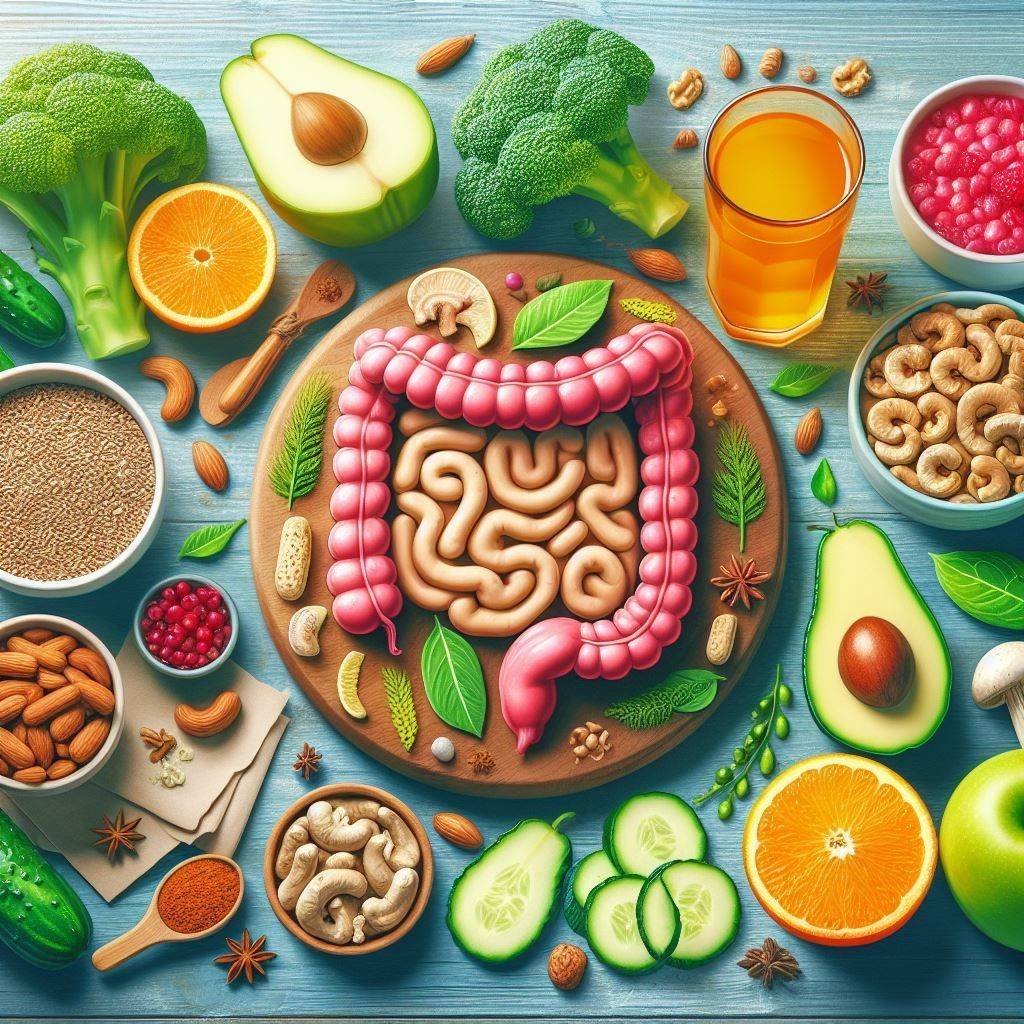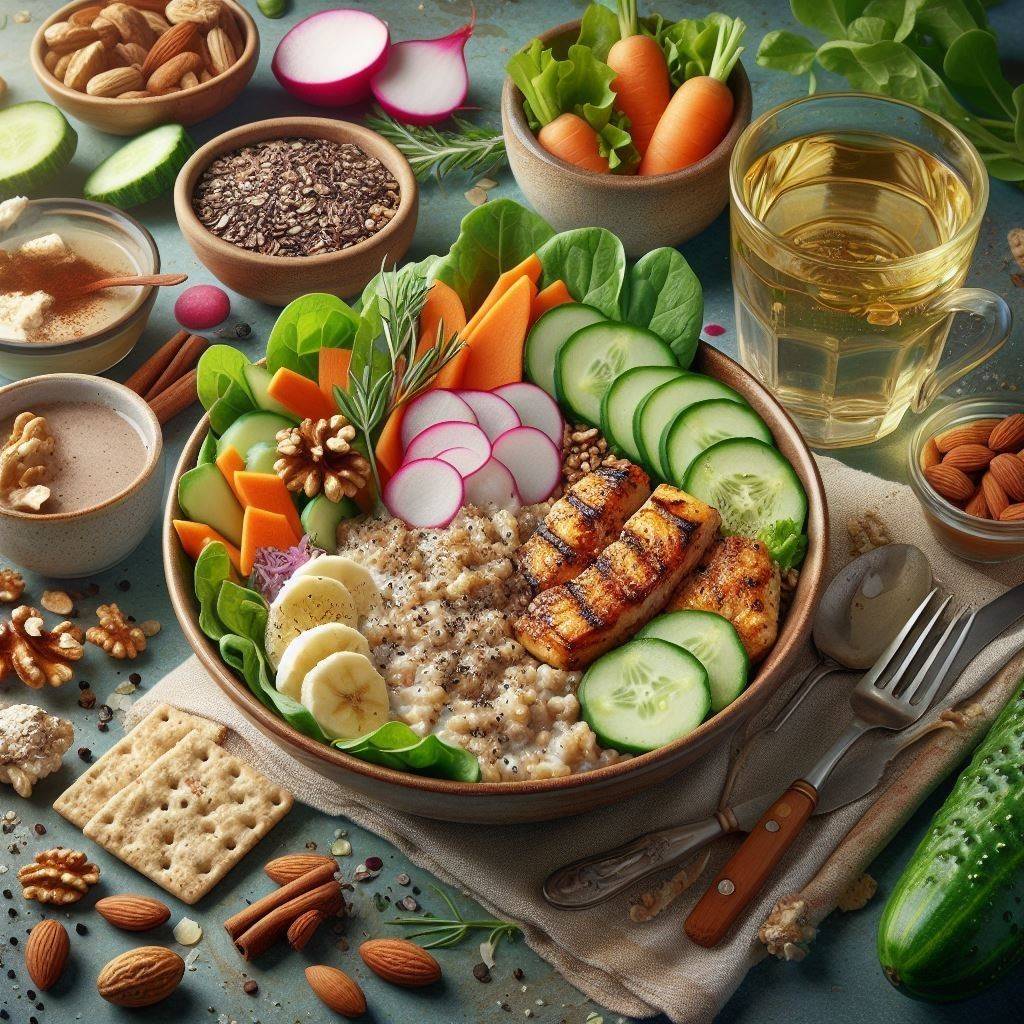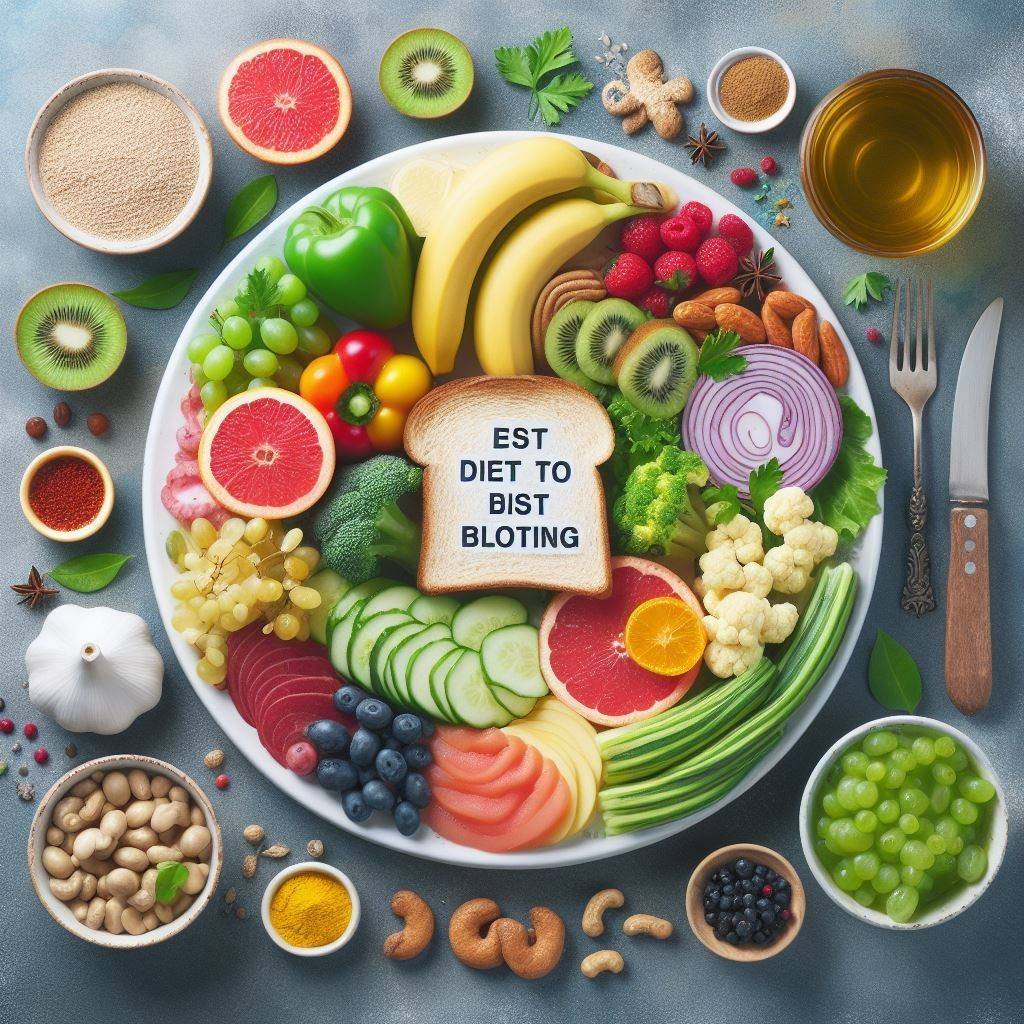Discover the ultimate guide to gut bliss with the best diet to prevent bloating. Uncover tips and tricks for a flat stomach and digestive harmony.
Introduction
We’ve all experienced that uncomfortable fullness and swelling in the abdomen known as bloating. It can leave you feeling sluggish and uneasy. While occasional bloating is normal, frequent bloating could indicate an underlying health issue. Making dietary and lifestyle changes can help reduce or prevent bloating. This article will explore the Best Diet to Prevent Bloating so you can find gut bliss.
What Causes Bloating?
There are several potential culprits behind that bloated belly:
- Food sensitivities: Gluten, dairy, and FODMAPs (fermentable carbs) are common bloat triggers.
- Constipation: Stool moving too slowly through the digestive tract allows gas to build up.
- Swallowing air: Carbonated drinks, drinking through straws, chewing gum, eating too fast.
- Small intestinal bacterial overgrowth (SIBO): Excess bacteria in the small intestine ferment carbs causing gas.
- Gut microbiome imbalance: An imbalance of gut bacteria disturbs digestion.
- Gut inflammation: Chronic inflammation affects gut function and motility.
- Hormonal fluctuations: Estrogen and progesterone affect the digestive system.
Identifying and avoiding your bloating culprits is key to finding the Best Diet to Prevent Bloating.
Top 12 Bloat-Busting Foods for Gut Bliss

Bloating can put a damper on your day. That swollen, gassy belly makes you feel sluggish and uncomfortable. The good news is certain foods can help beat the bloat thanks to their digestive superpowers.
Add these 12 bloat-busting all-stars to your diet for a flatter, happier belly:
-
Greek Yogurt
The probiotics in unsweetened Greek yogurt promote a healthy gut microbiome, improving digestion. The less sugar the better to avoid gas.
-
Steel Cut Oats
The soluble fiber in oats helps keep you regular and feeds gut bacteria. Skip the processed instant packs for better bloat benefits.
-
Almonds
These protein-packed nuts provide magnesium, which helps relax GI muscles to release gas and relieve constipation.
-
Papaya
Papaya delivers the enzyme papain, which aids protein digestion and reduces bloat-causing inflammation.
-
Kefir
Another probiotic powerhouse, the “good bugs” in kefir support digestive health and reduce gas.
-
Fennel Tea
Fennel has anti-spasmodic effects that relax and soothe intestinal muscles, allowing gas to pass.
-
Fresh Ginger
Ginger’s anti-inflammatory properties calm the gut while supporting healthy motility.
-
Peppermint Tea
Sip on mint tea after meals, as menthol gently relaxes digestive tract muscles.
-
Pineapple
Pineapple’s enzyme bromelain improves digestion, especially of bloat-causing proteins.
-
Green Bananas
Unripe bananas contain prebiotic fiber, perfect for feeding beneficial gut bacteria.
-
Turmeric
Curcumin, turmeric’s active compound, reduces inflammation and intestinal cramping.
-
Cucumbers
Cukes are high in water to keep you hydrated. Staying hydrated prevents constipation and bloating.
Fill your plate with these bloat-beating foods for improved digestion, reduced gas, and a flatter tummy. Say bye-bye to the bloat! Discover the best diet to prevent bloating and enjoy a happier, healthier digestive system.
Best Diet to Prevent Bloating: 14 Gut-Friendly Tips

Let’s explore diet and lifestyle factors that contribute to bloating and how to prevent it through a gut-friendly approach.
1. Eliminate Common Bloat Triggers
Begin by removing the usual suspects from your diet for 2-4 weeks:
- Gluten
- Dairy
- Soy
- Legumes
- Cruciferous veggies (broccoli, cauliflower, cabbage)
- Carbonated beverages
- Artificial sweeteners
- Sugar alcohols (sorbitol, xylitol)
Slowly reintroduce foods one at a time while monitoring symptoms to pinpoint problem foods. Keeping a food and symptom journal can help identify your personal Best Diet to Prevent Bloating.
2. Reduce FODMAPs
FODMAPs are fermentable carbs that can cause gas and bloating:
- Fructose (fruit, honey, high fructose corn syrup)
- Lactose (dairy)
- Polyols (sweeteners like xylitol)
- Fructans (wheat, garlic, onion)
- Galatians (legumes)
Work with a dietitian to tailor a low FODMAP diet to find your tolerable threshold. Restricting FODMAPs short term can improve bloating, but diversity is important long term.
3. Increase Fiber Gradually
Aim for 25-30g of fiber daily from veggies, fruits, nuts, and seeds. Ramp up slowly as sudden increases can cause gas and bloating. Drink plenty of water.
4. Try a Low-Histamine or Elimination Diet
Histamine intolerance or food sensitivities can manifest with gut issues like bloating. Trying an elimination diet, low-histamine diet or anti-inflammatory diet may help resolve symptoms. Work with a professional to ensure nutritional adequacy.
5. Eat More Prebiotics and Fermented Foods
Prebiotics are fibrous carbs that feed beneficial gut flora. Find them in onions, garlic, bananas, oats, apples, and asparagus. Fermented foods contain probiotics for gut health. Try kefir, kimchi, sauerkraut, miso, kombucha, yogurt.
6. Stay Hydrated
Aim for 2-3 liters of fluids daily, mainly water. Other options include herbal tea, broth, and diluted fruit juices. Staying hydrated keeps things moving through the digestive tract. Avoid drinking during meals which can interfere with digestion.
7. Eat Mindfully
Eat slowly, chew thoroughly, and minimize distractions. Being present helps properly digest food to prevent indigestion and gas. Don’t use straws that swallow excess air.
8. Manage Stress
Chronic stress negatively impacts gut health and function. Try meditation, yoga, and deep breathing. Get 7-9 hours sleep nightly. Exercise regularly to reduce stress.
9. Ask About Prescriptions or OTC Meds
Some medications like antibiotics can cause bloating. Speak to your pharmacist or doctor about alternatives if you suspect a medication link. Don’t self-discontinue.
10. See Your Doctor
If dietary changes don’t resolve chronic bloating, see your doctor to rule out medical conditions like SIBO or food intolerances. Testing may be needed. Treatment can provide lasting relief.
11. Limit Salt
Avoid adding extra salt to foods and minimize processed foods high in sodium. Excess sodium causes water retention and bloating.
12. Skip the Bubble Tea
Boba milk tea is tasty but tough to digest due to the tapioca balls and can lead to bloating and stomach discomfort. Opt for fresh brewed tea instead.
13. Take a Daily Walk
A brisk 20–30-minute walk helps stimulate the digestive system to keep things moving and prevent gas buildup.
14. Give Up Gum
Chewing gum causes excess swallowing of air which can lead to bloating. Even sugar-free gum contains sweeteners that can cause gas.
Supplements for Bloating Relief
Certain supplements may also aid in bloating relief:
- Probiotics: Restore gut flora balance. Lactobacillus and Bifidobacterium strains are best.
- Digestive enzymes: Support complete digestion to reduce gas. Try enzyme blends.
- Peppermint oil capsules: Help relax GI muscles to ease gas and cramps. Enteric-coated is preferable.
- Ginger: Has carminative properties to relax the gut and expel gas. Take capsules as needed.
Always consult your doctor before trying supplements, especially if taking medications. Start low and go slow.
Lifestyle Strategies for Bloat Reduction
- Exercise regularly – Stimulates digestion and gut motility to prevent constipation. Aim for 30 minutes daily.
- Massage your abdomen – Helps move gas and stool through the intestines. Use clockwise strokes.
- Try yoga positions – Poses like the child’s pose gently massage the abdomen.
- Avoid tight clothing – Constricting waistbands puts pressure on the abdomen.
- Quit smoking – Smoking causes bloating and digestive issues.
Sample Gut-Friendly Best Diet to Prevent Bloating Menu

Here is a sample one-day menu optimized to prevent bloating:
Breakfast: Oatmeal made with lactose-free milk, topped with sliced banana, walnuts, and cinnamon. Herbal tea.
Lunch: Leafy green salad with cucumbers, carrots, radishes, apple cider vinegar dressing, and grilled chicken or salmon. Glass of water.
Snack: Rice crackers with almond butter. Diluted fruit juice.
Dinner: Baked sweet potato and roasted Brussels sprouts. Piece of grilled fish. Glass of water with the meal, herbal tea afterwards.
Dessert: Frozen fruit popsicle made from blended berries.
Frequently asked questions about the Best Diet to Prevent Bloating
What foods reduce bloating?
Some foods that can help reduce bloating include yogurt with live cultures, peppermint tea, ginger, papaya, turmeric, and pineapple. The probiotics in yogurt and enzymes in pineapple and papaya can improve digestion and reduce gas. Ginger and peppermint have natural anti-inflammatory properties that relax the gut. In general, eating slowly, avoiding carbonated drinks, reducing salt, and limiting gas-producing foods like beans and cruciferous veggies can prevent bloating.
What is the best food to eat that doesn’t cause bloating?
Some of the best bloat-minimizing foods are oatmeal, eggs, salmon, leafy greens, rice, quinoa, lean meats like chicken or turkey, and non-cruciferous roasted veggies like zucchini, carrots, and asparagus. Having fennel seed tea after meals also aids digestion. The key is sticking to non-gassy foods that are high in fiber but low in fermentable carbs called FODMAPs.
How do I get rid of my bloated stomach fast?
Some quick ways to help relieve a bloated stomach include drinking mint or ginger tea, taking a warm bath, massaging your abdomen, lying on your left side, doing gentle yoga poses like child’s pose, taking a walk, and avoiding dairy, salt, gum, carbonated drinks, and too much fiber from fruits and veggies. Activated charcoal supplements may also absorb excess gas.
Does eating more reduce bloating?
Eating more can make bloating worse. Overeating causes indigestion, slows digestion, and leads to gas buildup. It’s best to eat smaller, frequent meals of bloat-friendly foods. Make sure to chew thoroughly and don’t drink during meals. Stay hydrated between meals to aid digestion. Reduce portion sizes if you feel bloated after eating.
Conclusion
Bloating can disrupt your comfort and confidence. By pinpointing your dietary triggers, adapting your diet, practicing mindful eating habits, managing stress, and making simple lifestyle changes, you can find relief from that puffy belly. Work with a doctor or dietitian to develop the Best Diet to Prevent Bloating tailored to your individual needs. With patience and consistency, you’ll be on your way to achieving lasting gut bliss and a flatter tummy.

Adel Galal is a health and wellness writer with over 30 years of experience studying and writing about health, fitness, nutrition, and healthy living. He is the founder of NextFitLife.com, where he shares practical, evidence-based guidance to support long-term health at any age. Adel’s mission is simple:
to help people make smarter health choices that fit real life, at any age.



